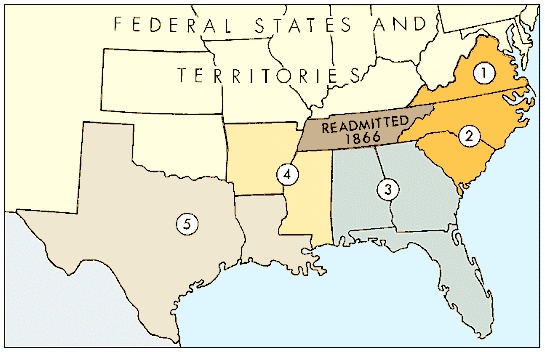Reconstruction
United States history
(1865–77), in U.S. history, period during and after the American Civil War in which attempts were made to solve the political, social, and economic problems arising from the readmission to the Union of the 11 Confederate states (South, the) that had seceded at or before the outbreak of war.
As early as 1862, Pres. Abraham Lincoln (Lincoln, Abraham) had appointed provisional military governors for Louisiana, Tennessee, and North Carolina. The following year, initial steps were taken to reestablish governments in newly occupied states in which at least 10 percent of the voting population had taken the prescribed oath of allegiance. Aware that the presidential plan omitted any provision for social or economic reconstruction, the Radical Republicans (Radical Republican) in Congress resented such a lenient political arrangement under solely executive jurisdiction. As a result, the stricter Wade–Davis Bill (Wade-Davis Bill) (q.v.) was passed in 1864 but pocket vetoed by the President.
After Lincoln's assassination (April 1865), Pres. Andrew Johnson (Johnson, Andrew) further alienated Congress by continuing Lincoln's moderate policies. The Fourteenth Amendment, defining national citizenship so as to include blacks, passed Congress in June 1866 and was ratified, despite rejection by most Southern states (July 28, 1868). In response to Johnson's intemperate outbursts against the opposition as well as to several reactionary developments in the South (e.g., race riots and passage of the repugnant black codes (black code) severely restricting rights of blacks), the North gave a smashing victory to the Radical Republicans in the 1866 congressional election.
 That victory launched the era of congressional Reconstruction (usually called Radical Reconstruction), which lasted 10 years starting with the Reconstruction Acts of 1867. Under that legislation, the 10 remaining Southern states (Tennessee had been readmitted to the Union in 1866) were divided into five military districts; and, under supervision of the U.S. Army, all were readmitted between 1868 and 1870. Each state had to accept the Fourteenth or, if readmitted after its passage, the Fifteenth Constitutional Amendment, intended to ensure civil rights of the freedmen. The newly created state governments were generally Republican in character and were governed by political coalitions of blacks, carpetbaggers (carpetbagger) (Northerners who had gone into the South), and scalawags (scalawag) (Southerners who collaborated with the blacks and carpetbaggers). The Republican governments of the former Confederate states were seen by most Southern whites as artificial creations imposed from without, and the conservative element in the region remained hostile to them. Southerners particularly resented the activities of the Freedmen's Bureau (q.v.), which Congress had established to feed, protect, and help educate the newly emancipated blacks. This resentment led to formation of secret terroristic organizations, such as the Ku Klux Klan and the Knights of the White Camelia. The use of fraud, violence, and intimidation helped Southern conservatives regain control of their state governments, and, by the time the last Federal troops had been withdrawn in 1877, the Democratic Party was back in power.
That victory launched the era of congressional Reconstruction (usually called Radical Reconstruction), which lasted 10 years starting with the Reconstruction Acts of 1867. Under that legislation, the 10 remaining Southern states (Tennessee had been readmitted to the Union in 1866) were divided into five military districts; and, under supervision of the U.S. Army, all were readmitted between 1868 and 1870. Each state had to accept the Fourteenth or, if readmitted after its passage, the Fifteenth Constitutional Amendment, intended to ensure civil rights of the freedmen. The newly created state governments were generally Republican in character and were governed by political coalitions of blacks, carpetbaggers (carpetbagger) (Northerners who had gone into the South), and scalawags (scalawag) (Southerners who collaborated with the blacks and carpetbaggers). The Republican governments of the former Confederate states were seen by most Southern whites as artificial creations imposed from without, and the conservative element in the region remained hostile to them. Southerners particularly resented the activities of the Freedmen's Bureau (q.v.), which Congress had established to feed, protect, and help educate the newly emancipated blacks. This resentment led to formation of secret terroristic organizations, such as the Ku Klux Klan and the Knights of the White Camelia. The use of fraud, violence, and intimidation helped Southern conservatives regain control of their state governments, and, by the time the last Federal troops had been withdrawn in 1877, the Democratic Party was back in power.About 1900, many U.S. historians espoused a theory of racial inferiority of blacks. The Reconstruction governments were viewed as an abyss of corruption resulting from Northern vindictiveness and the desire for political and economic domination. Later, revisionist historians noted that not only was public and private dishonesty widespread in all regions of the country at that time but also that a number of constructive reforms actually were introduced into the South during that period: courts were reorganized, judicial procedures improved, public-school systems established, and more feasible methods of taxation devised. Many provisions of the state constitutions adopted during the postwar years have continued in existence.
The Reconstruction experience led to an increase in sectional bitterness, an intensification of the racial issue, and the development of one-party politics in the South. Scholarship has suggested that the most fundamental failure of Reconstruction was in not effecting a distribution of land in the South that would have offered an economic base to support the newly won political rights of black citizens.